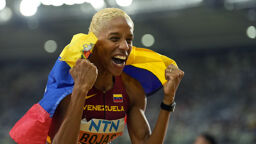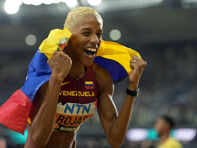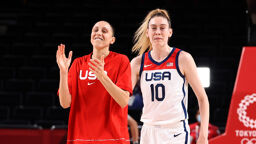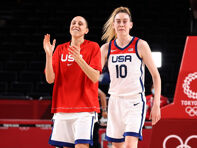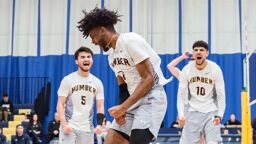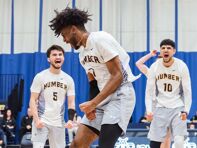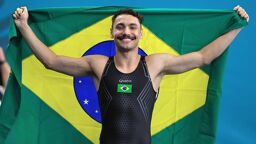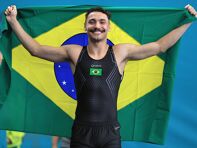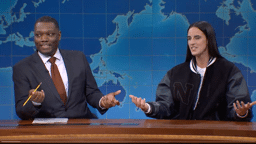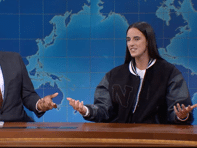Robbie Rogers is a soccer player. Robbie Rogers is gay. Until he signed Saturday with the Los Angeles Galaxy of Major League Soccer, Rogers never dreamed those two sides of him could co-exist. From now on, though, Rogers will be a pro soccer player who happens to be gay.
The biggest obstacle to Rogers playing the sport he loves has been Rogers. He was afraid of what would happen if he tried to play as an openly gay man, and that fear caused him to prematurely "retire" in February.
"I don't know what I was so afraid of," Rogers told the Associated Press. "It's been such a positive experience for me. The one thing I've learned from all of this is being gay is not that big of a deal to people."
I was always baffled by Rogers' decision to call it quits after coming out on his blog. At 25, he's still young enough and talented enough to play professionally, even if his career had hit a dead end in England. After his coming out, there was an outpouring of support from the soccer world. Rogers seemed skeptical of much of it, as if his former teammates saying they would welcome him back was just a case of them being politically correct. It never dawned on him, until recently, that they meant everything they said. It was Rogers' ingrained fear and lack of acceptance of himself that I think caused his initial reaction.
"I guess for 25 years I've just been afraid to share a secret with everyone else," Rogers said at his press conference with the Galaxy. "I thought I couldn't be both a soccer player and a gay athlete." He added that he felt like an "outcast," but realized that everyone is different in some way.
A key moment for Rogers came in March when he attended a Nike-sponsored LGBT youth event in Portland. As he heard these young people talk about changing the world's attitudes on gay issues, he said he felt like a "coward" for having retired.
"That Nike camp made me feel like a little soft," he said at his press conference. "It taught me I needed to man up a little bit. … It's easy to play a sport that you love and be a role model for people. It's a perfect situation for me."
Rogers' role as the first openly gay male pro team athlete in a major American sport is significant, but it has to be placed in perspective. MLS is nowhere near the level of the NFL, NBA, Major League Baseball or the NHL in terms of popularity. The best soccer players play in Europe, not MLS — unlike the athletes in the other American pro sports. Rogers won't be guarding LeBron James, pitching against Bryce Harper, catching passes from Peyton Manning or trying to stop Sydney Crosby. Jason Collins playing next season in the NBA will be a more significant story for this reason.
Yet, Rogers is a historic figure and his journey from a scared, closeted gay man to one who is out, proud and confident enough to step back on the field is inspiring. His new Galaxy teammates are also aware of the significance.
"In my opinion, it’s already a success whether he plays one minute or a thousand minutes or 10,000 minutes," forward Landon Donovan told Outsports' Cyd Zeigler. "It’s already a big step in the right direction for our society as a whole, so I’m proud to be a part of it."
Rogers is very aware of the stakes, and seems ready to embrace the challenges. "As a professional athlete there's always pressure," he said. "I'm very motivated to prove myself. I don't want to be the last cut on the [2014 U.S.] World Cup team. I want to make the World Cup team."
He is also in a perfect situation to succeed. MLS has adopted a zero-tolerance policy for homophobia, and twice in the past year has suspended players for on-field gay slurs. With the Galaxy, the Southern California native is playing at home for a team used to a media circus after having signed the now-retired David Beckham.
"We did have David Beckham here for quite a bit, so I don't think the media circus is going to get as big as that," Galaxy center back Omar Gonzalez told Outsports. "I think everyone is fine with all the media here coming in. I think Robbie is a great player and a great person, so with whatever comes with him coming to play with us, it's going to be fine. The only thing that matters is the onfield performance."
Watching Rogers at his press conference, it was striking to see how composed he looked and how readily he answered every question. He was honest about how he saw his role as gay trailblazer, saying he was "not sure" of its impact. He also acknowledged that there still needs to be changes in how society sees gay people, especially in sports.
Most of all, though, he seemed more excited about just being able to play. Whatever fears he had when he wrote his coming-out blog post in London alone one night this winter seem to have vanished, and in its place is an athlete eager to get back to doing what he loves the most.
"I feel very normal and very accepted and I hope that me coming back shows this is not a big deal," he said. "It's been a learning experience and I hope others can learn from this experience."









